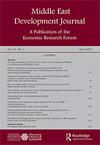State business relations and innovation in the MENA region
IF 0.9
Q4 DEVELOPMENT STUDIES
引用次数: 7
Abstract
ABSTRACT Understanding that Innovation is a major determinant of economic growth, this paper is investigating how to foster Innovation in the Middle East and North Africa (MENA) region given the institutional deficiencies suffered in many of its countries. More specifically, this paper is trying to find out how State-Business Relations (SBR) have contributed to Innovation capacities of the MENA. It also investigates whether SBR have counteracted some of the region's institutional deficiencies which hinder Innovation. While doing this, this paper differentiates between formal SBR (e.g. public private dialogues) and informal SBR (relations based on family, ethnic or political connections), and puts more theoretical emphasis on the National Innovation System (NIS) approach for fostering innovation. It uses regression analysis and provides three relatively (Innovation-wise) advanced non-Gulf MENA countries as examples for the sake of enriching the discussion through a comparative analysis; these are: Egypt, Tunisia and Morocco. Using various multivariate panel OLS regressions, various important findings are obtained. The results suggest that stronger Business Associations, formal SBR and comprehensive institutional reform are needed for fostering Innovation in the MENA region. Even if Cronyism and crony-based informal SBR seem to provide a functional allocative mechanism counteracting some institutional deficiencies, yet, Cronyism do more harm than good to Innovation. Hence, institutional reform in the MENA region should also place more emphasis on eradicating Cronyism.中东和北非地区的国有企业关系和创新
摘要了解到创新是经济增长的主要决定因素,鉴于中东和北非地区许多国家的制度缺陷,本文正在研究如何促进中东和北非区域的创新。更具体地说,本文试图了解国家商业关系(SBR)如何对中东和北非地区的创新能力做出贡献。它还调查了SBR是否弥补了该地区阻碍创新的一些制度缺陷。在这样做的同时,本文区分了正式的SBR(如公私对话)和非正式的SBR(基于家庭、种族或政治关系的关系),并在理论上更加强调国家创新体系(NIS)促进创新的方法。它使用回归分析,并以三个相对(创新方面)先进的非海湾中东和北非国家为例,通过比较分析丰富了讨论;它们是:埃及、突尼斯和摩洛哥。使用各种多变量面板OLS回归,获得了各种重要的发现。研究结果表明,为了促进中东和北非地区的创新,需要加强商业协会、正式的SBR和全面的制度改革。即使裙带关系和基于裙带关系的非正式SBR似乎提供了一种功能配置机制来抵消一些制度缺陷,但裙带关系对创新弊大于利。因此,中东和北非地区的体制改革也应该更加重视消除任人唯亲现象。
本文章由计算机程序翻译,如有差异,请以英文原文为准。
求助全文
约1分钟内获得全文
求助全文

 求助内容:
求助内容: 应助结果提醒方式:
应助结果提醒方式:


